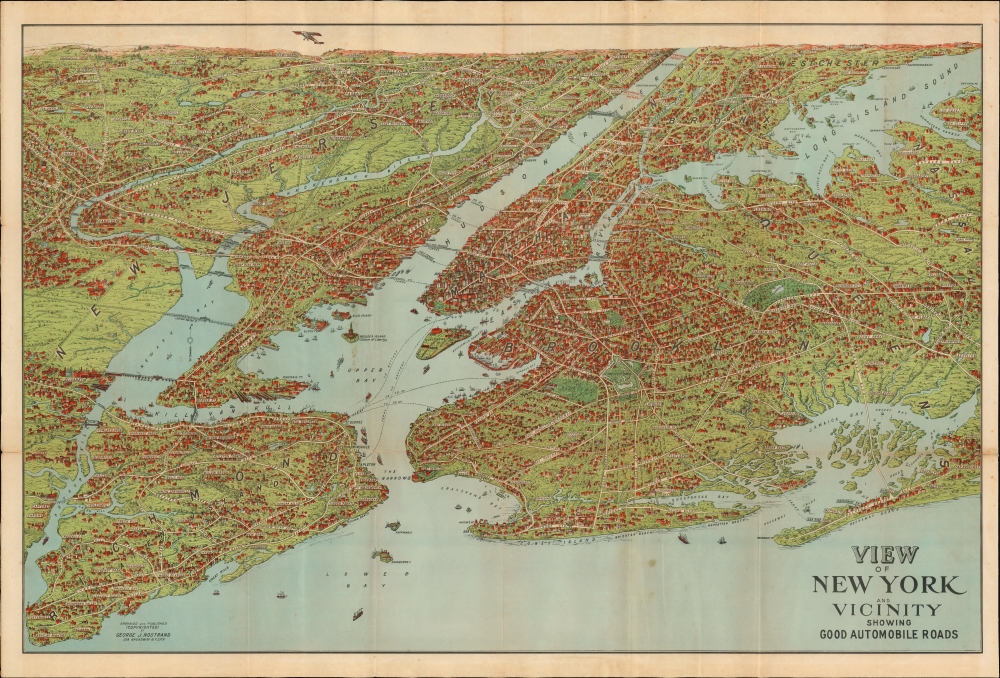This item has been sold, but you can get on the Waitlist to be notified if another example becomes available, or purchase a digital scan.
1928 Nostrand Birds Eye View Map of New York City, New York
ViewofNewYork-nostrand-1928-4$375.00

Title
View of New York and Vicinity Showing Good Automobile Roads.
1928 (undated) 21 x 30 in (53.34 x 76.2 cm)
1928 (undated) 21 x 30 in (53.34 x 76.2 cm)
Description
This is an engaging 1928 birds-eye view map of New York City and its vicinity by George J. Nostrand, in an unusual transitional state. Brightly colored and evocative, the view presents New York City and its surroundings at the height of 'the Roaring Twenties.' As the title suggests, it was meant to highlight New York City's auto-friendly roads during an era in which the automobile was still a novelty and the outer boroughs not fully urbanised.
A Closer Look
Ferry routes appear prominently, and the East River is spanned by the Brooklyn, Manhattan, Williamsburg, and Queensboro Bridges. All five New York City Boroughs are represented, and the map encompasses Westchester County, Bergen County, and Nassau County in Long Island. In addition to major roads, the map details specific neighborhoods, with the character of their development and topography beautifully rendered. Individual landmarks, buildings, and bridges are illustrated throughout, including the Statue of Liberty, Ellis Island, Grand Central, Madison Square Garden, the Museum of Natural History, and the Metropolitan Museum of Art. The harbor is full of ships while an airplane - in fact, Charles Lindbergh's Spirit of St. Louis - soars over Paterson.When in the Twenties?
Although the view is not dated, the detail of the map narrows the window considerably. Rumsey's date of 1925 is incorrect. The Spirit of St. Louis did not have its first flight until April 1927, and the Holland Tunnel was completed and named that year. - as it is here. The George Washington Bridge appears as 'proposed;' it was constructed between September 1927 and 1931 and would not be named until completion. (We are aware of a further state of the map with this 'proposed' notation removed, but still with no name for the bridge.) The Goethals Bridge, also unnamed and marked 'proposed', was constructed between 1925 and 1928. Between the early limit set by the aircraft and the tunnel and the late one set by the bridges, we are comfortable dating the production of this map to the latter part of 1927. In examples dated 1929, the ferries north of the proposed George Washington Bridge were erased, and the 'proposed' text was removed from the bridge, corresponding with its imminent opening. In the present example, the bridge is still marked 'proposed,' but the two ferries have been printed in red, not black, a variant we have never observed. We theorize that the change in color was in anticipation of the 1929 closure of the ferries and date the present example to late 1928.Linoleumville?
Also, on Staten Island at the location of present-day Travis-Chelsea, is marked the town of 'Linoleumville' - so named for being the site of America's first linoleum factory. At the beginning of the 20th century, Linoleumville was home to some 700 immigrants - English and Polish, predominantly - who had arrived to work in the American Linoleum Company factory. The linoleum workers comprised half of the local population. When the factory closed in 1930, the embittered town residents chose to change the name of the neighborhood back to Travis. The change did not go unnoticed. Many national newspapers ran an op-eds decrying the removal of colorful place names from American towns. The December 29, 1930, Olean Times ran the waspish comment, 'No doubt those residents of Linoleumville who were responsible for changing the name of the town to Travis felt they had been walked on long enough.'Publication History and Census
The map appears to be based on an earlier 1902 map by August R. Ohman, whose office was in the same building as Nostrand until 1925. This view was copyrighted, lithographed, and published by George J. Nostrand, whose shop was a few blocks north of the Woolworth Building, from whose observation deck this map was sold. OCLC shows two examples of the 1928 state and three of a further 1929 state in institutional collections. This present example (as noted) appears to be a late variant of the 1928 issue.Cartographer
George J. Nostrand (fl. 1920-30) was an American lithographer and publisher of maps and views, primarily of New York City. He appears to have been in the employ of the Arthur Ohman Map Co. until the firm’s closing in 1925. Thereafter he operated from the same location under his own name as late as 1939. More by this mapmaker...
Condition
Good. Mended at junctures of folds with very minor loss. Still an attractive example overall.
References
Rumsey 11270.000. OCLC 429466410.

